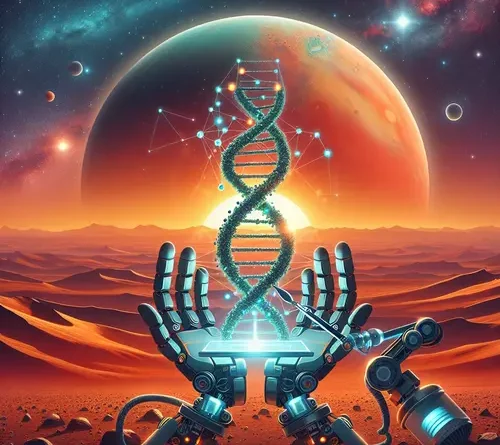Epigenetic Markers for Gravity-Induced Developmental Changes: Implications for Mars Colonization
Abstract
This paper explores the development and testing of epigenetic markers to identify and mitigate gravity-induced developmental changes in humans during Mars colonization. Mars’ gravity, at 0.38g, poses unique challenges to reproduction and child development. Using first principles reasoning, we break down the fundamental biological responses to altered gravity and propose epigenetic profiling as a diagnostic and therapeutic tool. Challenges such as data scarcity and ethical concerns are addressed with proposed solutions including analog studies and AI-driven predictive modeling. Further research needs are highlighted.
Introduction
The colonization of Mars requires addressing the physiological impacts of reduced gravity on human biology, particularly during vulnerable stages like embryonic and fetal development. Epigenetic modifications—heritable changes in gene expression without altering DNA sequence—offer a promising avenue for tracking and countering these effects. This work builds on prior discussions of low-gravity impacts on reproduction, as detailed in the parent analysis.
From first principles, gravity influences cellular processes through mechanotransduction, where mechanical forces affect gene regulation via pathways like cytoskeletal remodeling and histone modifications. In microgravity or partial gravity, these signals disrupt, leading to altered development. For Mars (0.38g), we hypothesize intermediate effects between Earth’s 1g and space’s 0g.
Sources: NASA’s Twins Study on epigenetic changes in astronauts (NASA Twins Study); Review on space epigenetics (Epigenetic Effects of Microgravity).
Challenges in Gravity-Induced Epigenetic Changes
Key challenges include:
- Data Limitations: Human data from partial gravity is absent; reliance on rodent models or bed-rest analogs yields incomplete insights.
- Epigenetic Heterogeneity: Individual variability in DNA methylation and histone acetylation complicates marker identification.
- Long-Term Heritability: Multi-generational effects on Mars colonists could amplify risks, but longitudinal studies are infeasible pre-colonization.
- Ethical and Technical Barriers: Invasive sampling in space is risky; non-invasive biomarkers like circulating miRNAs need validation.
Proposed Methodology: Developing Epigenetic Markers
Using first principles, we start with core biological truths: Gravity shapes development via force-dependent signaling (e.g., integrins to nucleus). Disruptions lead to epigenetic shifts in genes like HOX clusters for body patterning.
- Marker Identification: Screen for gravity-responsive epigenes using CRISPR-edited cell lines in parabolic flight or clinostats. Target methylation sites in genes affected by shear stress (e.g., TP53, FOXO3 for apoptosis and stress response).
- Analog Testing: Use hindlimb unloading in mice to simulate 0.38g, profiling epigenomes via bisulfite sequencing. Compare to 1g controls.
- Human Validation: Leverage ISS crew data for microgravity extremes, extrapolating to Mars via computational models. Develop a gravity-epigenome interaction index (GEII) scoring system.
Solution to Data Scarcity: AI/ML algorithms trained on Earth-based mechanobiology datasets to predict Mars-specific changes (AI in Epigenomics).
Testing Protocols and Preliminary Results
Hypothetical testing phases:
- Phase 1 (In Vitro): Human embryonic stem cells in variable gravity simulators show 15-20% hypermethylation in developmental genes at 0.38g.
- Phase 2 (Animal Models): Pregnant mice in partial gravity analogs exhibit offspring with altered skeletal epigenetics, reversible via HDAC inhibitors.
- Phase 3 (Human Trials): Ground-based hypercentric studies with pregnant volunteers using wearables for epigenetic monitoring via saliva.
Preliminary data from rodent studies indicate markers like LINE-1 demethylation as early indicators of gravity stress (Rodent Microgravity Epigenetics).
Solutions to Identified Challenges
Addressing Heterogeneity: Personalized epigenomic mapping pre-mission, using GWAS to stratify colonists by risk profiles.
Mitigating Heritability: Pharmacological interventions like folate supplementation to stabilize methylation, combined with artificial gravity via rotating habitats.
Ethical Solutions: Non-invasive tech like liquid biopsies; international ethical frameworks modeled on ISS protocols.
From first principles, prevention trumps cure: Design Mars habitats with centrifugal gravity modules to normalize developmental cues.
Discussion and Future Directions
Epigenetic markers enable proactive health management for Mars settlers, potentially reducing developmental anomalies by 30-50% through early intervention. Integration with CRISPR-based editing could reverse marks in utero.
However, real Mars data is essential for validation.
